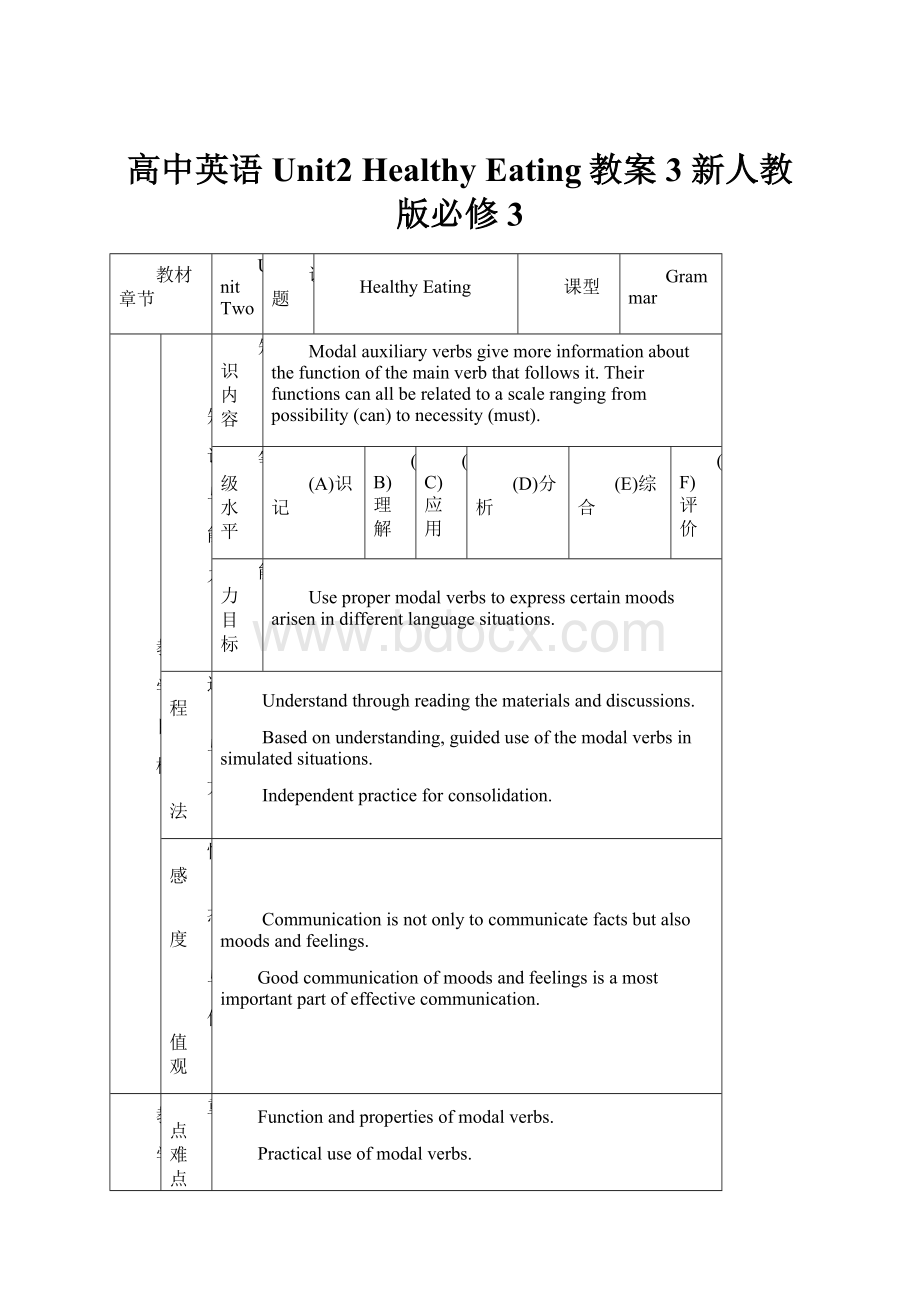高中英语 Unit2 Healthy Eating教案3 新人教版必修3.docx
《高中英语 Unit2 Healthy Eating教案3 新人教版必修3.docx》由会员分享,可在线阅读,更多相关《高中英语 Unit2 Healthy Eating教案3 新人教版必修3.docx(20页珍藏版)》请在冰豆网上搜索。

高中英语Unit2HealthyEating教案3新人教版必修3
教材章节
UnitTwo
课题
HealthyEating
课型
Grammar
教
学
目
标
知
识
与
能
力
知识内容
Modalauxiliaryverbsgivemoreinformationaboutthefunctionofthemainverbthatfollowsit.Theirfunctionscanallberelatedtoascalerangingfrompossibility(can)tonecessity(must).
等级水平
(A)识记
(B)理解
(C)应用
(D)分析
(E)综合
(F)评价
能力目标
Usepropermodalverbstoexpresscertainmoodsarisenindifferentlanguagesituations.
过程
与
方法
Understandthroughreadingthematerialsanddiscussions.
Basedonunderstanding,guideduseofthemodalverbsinsimulatedsituations.
Independentpracticeforconsolidation.
情感
态度
与
价值观
Communicationisnotonlytocommunicatefactsbutalsomoodsandfeelings.
Goodcommunicationofmoodsandfeelingsisamostimportantpartofeffectivecommunication.
教
学
设
计
重点难点分析
Functionandpropertiesofmodalverbs.
Practicaluseofmodalverbs.
教学
技术
设备
Multi-media
教
学
环
节
学
习
目
标
1、学习的主要知识
Functionandusageofmodalverbs.
2、需要掌握的方法
Situationcenteredpractice
课
题
概
述
本节知识的主要意义
Goodcommunicationofmoodsandfeelingswithmodalverbsisamostimportantpartofeffectivecommunication.
本节知识在知识体系中的地位和联系
“Modalverb+do”isoneofthewaysoffivewaysofhowthepredicateisformed.
石家庄市第一中学教案
教学环节
分析讲解
学生活动设计
Stepone
Introduction
IntheEnglishlanguage,amodalverbisanauxiliaryverbthatcanbeusedtochangethegrammaticalmoodofasentence.Thekeywaytoidentifyamodalverbisbyitsdefectiveness(theyhaveneitherparticiplesnorinfinitives).
ThemodalverbsinEnglishareasfollows,pairedaspresentandpreteriteforms:
shallandshould
willandwould
mayandmight
canandcould
must
Thefollowingarenotmodalverbsbutmaybeusedforasimilarpurpose:
oughttoandhadbetter
usedto
dareandneed
do
goingto
haveto
Howthemodalverbsareused(I)
Shallandwill
Shallisusedinmanyofthesamesensesaswill,thoughnotalldialectsuseshallproductively,andthosethatusebothshallandwillgenerallydrawadistinction(thoughdifferentdialectstendtodrawdifferentdistinctions).Instandard,perhapsold-fashionedEnglish,shallinthefirstperson,singularorplural,indicatesmerefuturity,butinotherpersonsshowsanorder,commandorprophecy:
"Cinderella,youshallgototheball!
"Itis,therefore,impossibletomakeshallquestionsinthesepersons.Shallwe?
makessense,shallyou?
doesnot.
Shallderivesfromamainverbmeaningtoowe,andindialectsthatusebothshallandwill,itisoftenusedininstanceswhereanobligation,ratherthananintention,isexpressed.
Shallisalsousedinlegalandengineeringlanguagetowritefirmlawsandspecificationsasintheseexamples:
"Thoseconvictedofviolatingthislawshallbeimprisonedforatermofnotlessthanthreeyearsnormorethansevenyears,"and"Theelectronicsassemblyshallbeabletooperatewithinitsspecificationsoveratemperaturerangeof0degreesCelsiusto70degreesCelsius."
Should
Shouldiscommonlyused,evenindialectswhereshallisnot.Thenegationis"shouldnot"(orthecontraction"shouldn't").
Shouldcandescribeanidealbehaviouroroccurrenceandimpartsanormativemeaningtothesentence;forexample,"Youshouldneverlie"meansroughly,"Ifyoualwaysbehavedperfectly,youwouldneverlie";and"Ifthisworks,youshouldnotfeelathing"meansroughly,"Ihopethiswillwork.Ifitdoes,youwillnotfeelathing."Indialectsthatuseshallcommonly,however,thisrestrictiondoesnotapply;forexample,aspeakerofsuchadialectmightsay,"IfIfailedthattest,IthinkIshouldcry,"meaningthesamethingas,"IfIfailedthattest,IthinkIwouldcry."
Insomedialects,itiscommontoformthesubjunctivemoodbyusingshould:
"Itisimportantthatthelawshouldbepassed"(whereotherdialectswouldsay,"Itisimportantthatthelawbepassed")or"Ifitshouldhappen,wearepreparedforit"(or"Shouldithappen,wearepreparedforit";whereearlyModernEnglishwouldsay,"Ifithappen,wearepreparedforit,"andmanydialectsoftodaywouldsay,"Ifithappens,wearepreparedforit").
Mayandmight
Mayandmightdonothavecommonnegativecontractions(equivalentstoshan't,won't,can't,couldn'tetc),althoughmightn'tcanoccurinaskingquestions.("Mightn'tIcomeinifItookmymuddybootsoff?
"asareplyto"Don'tcomeinhere!
You'llgetthefloordirty!
")
Bothformscanbeusedtoexpressapresenttimepossibilityoruncertainty("Thatmaybe.").Mightandcouldcanalsobeusedinthissensewithnopasttimemeaning.Mightandmaywouldcarrythesamemeaningin"Johnisnotintheofficetoday,andhecouldbesick."
Mayisalsousedtoexpressirrelevanceinspiteofcertainorlikelytruth:
"HemaybetallerthanIam,butheiscertainlynotstronger"maymeanroughly,"WhileitistruethatheistallerthanIam,thatdoesnotmakeadifference,asheiscertainlynotstronger."(However,itmayalsomean,"IamnotsurewhetherheistallerthanIam,butIamsurethatheisnotstronger.")Thisisthemeaninginthephrase"Bethatasitmay."Mightcanbeusedinthissenseaswell.
Mightcanbeusedinthefirstpersontoexpressthatfutureactionsarebeingconsidered."Imightgotothemalllater"meansthatthespeakeristhinkingaboutgoingtothemall.
Mayormightcanbeusedinaquestiontoaskforpermission.Onewhoissaying"MayIuseyourphone?
”isaskingforpermissiontousethephoneofthepersonbeingspokento.'Can'or'could'canbeusedinstead,althoughformalAmericanEnglishprefers'may'.Inbothcasesthepreteritformisviewedasmorehesitantorpolite.
Canandcould
Thenegationofcanisthesingleword"cannot",occasionallywrittenastwowords"cannot"[3]orthecontraction"can't".Thenegationofcouldis"couldnot",or"couldn't".
Canisusedtoexpressability."IcanspeakEnglish"means"IamabletospeakEnglish",or"IknowhowtospeakEnglish".
Itisalsousedtoexpressthatsomestateofaffairsispossible,withoutreferringtotheabilityofapersontodosomething:
"Therecanbeaverystrongrivalrybetweensiblings"canhavethesamemeaningas"Thereissometimesaverystrongrivalrybetweensiblings".
Cannotandcan'tcanbeusedtoexpressbeliefsaboutsituations:
"Hecannothaveleftalready;whywouldhewanttogettheresoearly?
"expresseswithlesscertaintythesamepropositionas"Hehasnotleftalready"does.
Bothcanandcouldcanbeusedtomakerequests:
"Canyoupassmethecheese?
”means"Pleasepassmethecheese".Couldcanbeusedinthesameway,andmightbeconsideredmorepolite.
Must
Musthasnocorrespondingpreteritform.Thenegationis"mustnot"or"mustn't".Anarchaicvariantisthewordmote,asusedintheexpression"somoteitbe".
Mustandhavetoareusedtoexpressthatsomethingisobligatory("Hemustleave").Itcanbeusedtoexpressaprohibitionsuchas"Youmustnotsmokeinhere",oraresolutionsuchas"Imustn'tmakethatmistakeagain".
Thereisadistinctionbetweenmustandhavetointhenegativeforms.Inthesentence"Youmustnotgo",itisbeingexpressedthatitisobligatoryforthepersonbeingspokentonottogo;whereasinthesentence"Youdonothavetogo"itisbeingexpressedthatitisnotobligatoryforthepersontogo.
Havetocanbeusedforanongoingobligation,suchas"hehastobecareful".
Mustandhavetoareusedtoexpressbeliefs(theepistemicratherthandeonticuse),suchas"Itmustbeheresomewhere"or"Ithastobeheresomewhere",withthesamemeaningas"Ibelievethatitverylikelythatitisheresomewhere
Steptwo:
Guidedexploration
can&could
Readthefollowingsentencesandtellthemeaningofthewordsinbold:
Someofuscanusethecomputernow,butwecouldn’tlastyear.(ability)
Canshebeinthecomputercenter?
(possibility)
Can/CouldIuseyourdictionary?
(request)
Youcangohomenow.(permission)
Exercises
1.Michael____beapoliceman,forhe’smuchtooshort.
A.needn’tB.can’tC.shouldD.may
2.Mr.Bushisontimeforeverything.How____itbethathewaslatefortheopeningceremony?
A.canB.shouldC.mayD.must
3.----IstayedatahotelwhileinNewYork.
----Oh,didyou?
You____withBarbara.
A.couldhavestayedB.couldstay
C.wouldstayD.musthavestayed
4.MysistermethimattheGrandTheateryesterdayafternoon,sohe____yourlecture.
A.couldn’thaveattendedB.needn’thaveattended
C.mustn’thaveattendedD.shouldn’thaveattended
Keys:
BAAA
might&may
Readthefollowingsentencesandtellthemeaningofthewordsinbold:
---MayIwatchTVaftersupper?
---Yes,youmay.(permission)
TodayisSunday.Shemaynotbeinherofficenow.(possibility)
Youmayaswellgoandhavealook.(suggestion)
Mayyousuccess.(wish)
Exercises
1.SorryI'mlate.I_____haveturnedoffthealarmclockandgonebacktosleepagain.
A.mightB.should
C.canD.will
2.Peter_____comewithustonight,butheisn’tverysureyet.
A.mustB.may
C.canD.will
3.Somepeoplewhodon’tliketotalkmucharenotnecessarilyshy;theyjustbequietpeople.
A.mustB.may
C.shouldD.would
4.Liza___wellnotwanttogoonthetrip---shehatestraveling.(2008全国II)
A.will B.can C.must D.may
Keys:
ABBD
will&would
Readthefollowingsentencesandtellthemeaningofthewordsinbold:
Willyoulendmeyourbook?
(request)
Wouldyoulikeacupoftea?
(suggestion)
I’llneverdothatagain.(determination)
Hewilloftenreadallnight.(habit)
Everyevening,shewouldsitbywindow,deepinthought.(habit)
Thisdoorwon’topen.(failureofeffort)